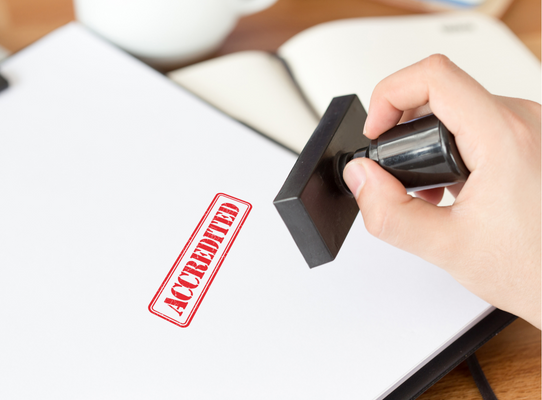Small business owners have difficulty attracting new customers unless a friend, family member, or acquaintance recommends them. People are habitual and have difficulty trusting strangers, especially with money.
Luckily for small businesses, there are more reliable methods to earn trust in today’s time. The BBB is an example of one of these methods. They help businesses gain the confidence of consumers and the general public, which opens the door for smaller businesses to grow.
If you’re a business wondering if being BBB accredited is worth the hassle and cost, here is some information that may prove helpful.
Brief BBB History
Before you ask yourself, “how does a business get BBB accredited,” it’s vital to understand why the BBB matters.
First, BBB stands for the Better Business Bureau. The BBB, founded in 1912, is a nonprofit focusing on informing the public about businesses and their credibility.
The BBB ranks its members on a grading scale familiar to most Americans. The grading scale ranges from A to F, with A being the best and F being the worst.
BBB takes consumer complaints and acts as a mediator between the business and consumer to address the problems. If the business doesn’t resolve the issue promptly, it will affect its BBB rating.
Unlike most review sites where people can complain anonymously, BBB takes consumer information to ensure that severe accusations are accurate. The longevity and requirements of the BBB are what build its credibility.
What Is BBB Accreditation?
Now that you’re familiar with the Better Business Bureau, you’ll want to know about their BBB accredited membership. Being BBB certified means that you as a business are trustworthy and stand with the BBB and the public.
Having this backing ensures that your business will follow ethical practices, honor promises, and be responsible for consumer problems and worries associated with your business. For consumers, being BBB accredited means there is no fear in doing business with you.
BBB Accreditation Requirements for Small Business
Becoming an accredited business means following and upholding the standards set by the BBB. The BBB expects eight leading standards from all of its members.
Build Trust
Businesses must be active within at least six months before their application. Additionally, companies must have all their licenses for operation, meet all government standards, and maintain at least a B rating at their local BBB office and headquarters.
Advertise Honesty
You must meet all legal and ethical advertising standards when advertising your business’s product or service.
Tell The Truth
You must represent your products and services as honestly as possible. Disclosure on all accounts is necessary to have a good standing.
Be Transparent
Businesses must provide consumers with clear guidelines and policies when they purchase a product from them or use their service. Disclosure of refund policies, contact information, receipts for purchases, and potential credit payments is vital for transparency.
Honor Promises
Businesses must fulfill all contractual obligations to their consumers.
Be Responsive
Companies must address any complaints in a professional and timely manner.
Safeguard Privacy
Protect all customer and client data to the best of your ability and inform those individuals of your efforts.
Embody Integrity
Approach every business transaction and interaction ethically and with good faith.
How Much Does it Cost To Be BBB Accredited?
The price of becoming BBB accredited depends on the size of your business. Two factors will influence the cost of your BBB accreditation fees. The first is the number of employees, and the second is your local BBB office.
Small businesses under five employees can expect to pay an average of $400 up to $600 annually. From that point on, you’ll find your annual fees scale depending on your employee number.
How Long Does it Take To Get BBB Accredited?
You can expect a minimum wait of two to three weeks for your BBB membership application. An unfortunate downside to getting BBB accredited is its long wait.
Since your local BBB office usually operates as business owners and board directors themselves, they don’t meet up too often. You’ll find that your BBB application can take weeks and sometimes even months, depending on your local office.
Does it Matter if a Business Is Not BBB Accredited?
Depending on the business, it doesn’t matter too much. The importance of business accreditation depends on a few factors. The first factor is the consumer. How important is a business’s reputation to the consumer?
For example, businesses that provide standardized services like gas stations don’t heavily benefit from the BBB. Although, companies that handle your money and investment benefit heavily from being accredited.
On the other hand, you may ask yourself, how much line of credit can I get for my business? You’ll want to go to a trustworthy financial institution that follows BBB’s ethical standards and practices.
Small businesses rarely know how a revolving line of credit works until they learn it from their credit providers. So, it’s worth being BBB accredited if you’re a loan provider. Especially since today, you can put your BBB accreditation on your physical and digital business card.
BBB Accreditation Pros and Cons
Just like any system, there are advantages and downsides. BBB accreditation has a few distinct benefits for consumers and businesses but some inherent downsides.
Pros
Provides an avenue of trust
Increases credibility
Potential exposure
Cons
Requires annual fees
Customers may not check reviews or accreditation
Decrease in relevance
Is BBB Accreditation Worth it?
Your reputation and ethical standing value depend entirely on your business values. For service businesses, reputation is everything. Most of the time, human interactions become the standpoint of success or failure.
If service businesses have a negative perception, people will naturally begin to avoid them. No one wants to go to a restaurant that provides horrible service. Additionally, no one wants to deal with a consultant who has no idea what they’re saying.
Even so, businesses have found ways to build trust and credibility through other mediums that don’t cost money. Google reviews, Trustpilot, and Yelp are review-based platforms that consumers use to check the credibility of businesses.
Overall, if you’re a service-based business with no problem affording BBB accreditation, it’s most certainly worth it. If you’re an already established brand with a reputation, there is little to no need for BBB accreditation.
Click here for more details on financing options or call 214-629-7223 or email jthomas@fmconsulting.net for more information. Or, apply now.
An Outsourced CEO and expert witness, Jim Thomas is the founder and president of Fitness Management USA Inc., a management consulting, turnaround and brokerage firm specializing in the gym and sports industry. With more than 25 years of experience owning, operating and managing clubs of all sizes, Thomas lectures and delivers seminars, webinars and workshops across the globe on the practical skills required to successfully overcome obscurity, improve sales, build teamwork and market fitness programs and products. Visit his Web site at: www.fmconsulting.net or www.youtube.com/gymconsultant.






